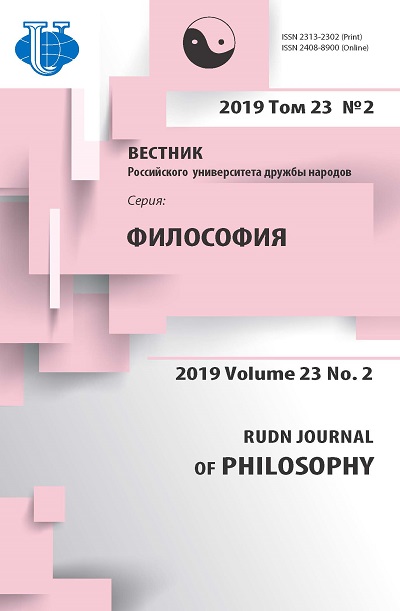RUSSIAN EUROPEAN B.V. YAKOVENKO
- Authors: Belov V.N.1
-
Affiliations:
- Peoples’ Friendship University of Russia (RUDN University)
- Issue: Vol 23, No 2 (2019)
- Pages: 133-144
- Section: HISTORY OF RUSSIAN PHILOSOPHY
- URL: https://journals.rudn.ru/philosophy/article/view/21504
- DOI: https://doi.org/10.22363/2313-2302-2019-23-2-133-144
Cite item
Full Text
Abstract
The article analyzes the creativity of one of the most famous Russian neokantians Boris V. Yakovenko. Despite the fact that the work of Yakovenko becomes the subject of analysis of an increasing number of researchers both in Russia and abroad, it has not yet taken place in a systematic analysis. The article attempts to consider the philosophical creativity of the Russian philosopher systematically, revealing both the main directions of European thought that had the greatest influence on the position of Yakovenko and the main areas of philosophy to which the efforts of the national thinker were directed. These, according to the author, include the history of philosophy and the system of so-called transcendental pluralism. It is pointed out that the history of philosophy for Yakovenko is a single holistic process and therefore is the history of the development of philosophical ideas, and not the history of life and work of individual philosophers. According to Yakovenko, the general philosophical scheme of historical development looks like this: from Greek cosmism to German epistemology and the beginning ontological turn in modern philosophy. There is also the belief of B.V. Yakovenko that there is no national philosophy. In his opinion, philosophy, as well as science in General, can only be international. His second main thesis concerning the development of philosophy is that philosophy should be independent from other branches of human knowledge and knowledge. She must not be a servant of theology or science. The article also presents various stages of the Russian philosopher's development of his version of the concept of pluralistic philosophy. According to Yakovenko, only pluralistic philosophy is able to know the essence as the main object of philosophy.
About the authors
V. N. Belov
Peoples’ Friendship University of Russia (RUDN University)
Author for correspondence.
Email: belov_vn@rudn.university
доктор философских наук, заведующий кафедрой онтологии и теории познания Российского университета дружбы народов
Miklukho-Maklaya Str., 6, Moscow, Russia, 117198References
- Ermichev AA. O neokantiaze B.V. Jakovenko I ego meste v russkoji filosofii [About Neokantianer B.V. Yakovenko and his place in Russian philosophy]. In: Jakovenko BV. Moch filosofii [Power of philosophy]. St. Petersburg: Nauka; 2000. P. 5—45. (In Russ.).
- Ermichev AA. Zhizn’ i filosofija Borisa Valentinovicha Jakovenko [The life and philosophy of Boris V. Yakovenko]. In: Boris Valentinovich Jakovenko [Boris V. Yakovenko]. AA Ermichev, editor. Moscow: Rossijiskaja poloticheskaja enziklopedija (ROSSPEN); 2012. P. 71—123. (In Russ.).
- Magid S. Filosoph Jakovenko. Podgotovitel’nie materiali [Philosopher Yakovenko. Preparatory material]. In: Boris Valentinovich Jakovenko [Boris V. Yakovenko]. AA Ermichev, editor. Moscow: Rossijiskaja poloticheskaja enziklopedija (ROSSPEN); 2012. P. 9—71. (In Russ.).
- Renna K. Boris Jakovenko i evropejskaja filosofskaja kultura: biograficheskaja rekonstrukzija [Boris Yakovenko and European philosophical culture: biographical reconstruction] In: Boris Valentinovich Jakovenko [Boris V. Yakovenko]. AA Ermichev, editor. Moscow: Rossijiskaja poloticheskaja enziklopedija (ROSSPEN); 2012. P. 123—143. (In Russ.).
- Shitov AM. Archiv BV Jakovenko v Prage [B. V. Yakovenko archive in Prague]. In: Boris Valentinovich Jakovenko [Boris V. Yakovenko]. AA Ermichev, editor. Moscow: Rossijiskaja poloticheskaja enziklopedija (ROSSPEN); 2012. P. 509—515. (In Russ.).
- Jakovenko BV. Obzor nemezkoji filosofii [Overview of German philosophy]. Logos. 1910; (1): 250—267. Moscow. (In Russ.).
- Belov VN. BV Jakovenko i neokantianstvo [Boris V. Yakovenko and Neo-Kantian] In: Boris Valentinovich Jakovenko [Boris V. Yakovenko]. AA Ermichev, editor. Moscow: Rossijiskaja poloticheskaja enziklopedija (ROSSPEN); 2012. P. 288—306. (In Russ.).
- Jakovenko BV. Filosofija Ed. Gusserlja [The Philosophy of Ed. Husserl] In: Jakovenko BV. Moch filosofii [Power of philosophy]. St. Petersburg: Nauka; 2000. P. 581—628. (In Russ.).
- Jakovenko BV. Vil’gel’m Vindel’band [Wilhelm Windelband]. In: Jakovenko BV. Moch filosofii [Power of philosophy]. St. Petersburg: Nauka; 2000. P. 473—485. (In Russ.).
- Jakovenko BV.O poloshenii i zadachach filosofii v Rossii [On the position and tasks of philosophy in Russia]. In: Jakovenko BV. Moch filosofii [Power of philosophy]. St. Petersburg: Nauka; 2000. P. 711—740. (In Russ.).
- Jakovenko BV. Ocherki russkoji filosofii [Essays on Russian philosophy]. In: Jakovenko BV. Moch filosofii [Power of philosophy]. St. Petersburg: Nauka; 2000. P. 740—843. (In Russ.).
- Jakovenko BV. Chto takoje filosofija? (vvedenije v transzendentalizm) [What is philosophy? (introduction to transcendentalism)]. In: Jakovenko BV. Moch filosofii [Power of philosophy]. St. Petersburg: Nauka; 2000. P. 91—164. (In Russ.).
- Jakovenko BV. Ob immanentnom transzendentizme, transzendentnom immanentizme i dualizme voobzhe (vtoroje, bolee spezial’noe vvedenije v transzententalizm) [On immanent transcendence, transcendent immanentism and dualism in general (the second, more special introduction to transcendentalism)]. In: Jakovenko BV. Moch filosofii [Power of philosophy]. St. Petersburg: Nauka; 2000. P. 164—244. (In Russ.).
- Jakovenko BV. Suzhnost’ pljuralizma [Essence of pluralism]. In: Jakovenko BV. Moch filosofii [Power of philosophy]. St. Petersburg: Nauka; 2000. P. 282—295. (In Russ.).
- Jakovenko BV. Kritische Bemerkungen über die Phänomenologie (Kriticheskije zametki o fenomenologii) [Critical notes on phenomenology]. In: Antologija fenomenologicheskoji filosofii v Rossii. Chubarov IM, editor. M.: Logos, Progress-Tradizija, 2000. P. 342—353. (In Russ.).
















